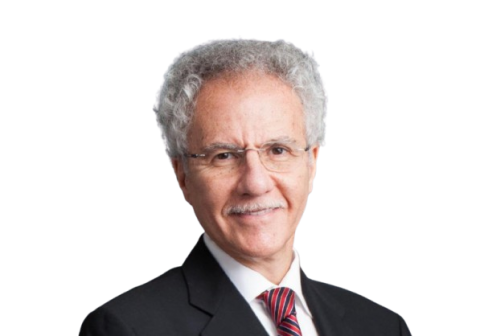Dr. Enrico Ascher’s journey in vascular surgery began in Rio de Janeiro, where his fascination with human anatomy led him to pursue a career in medicine at the Federal University of Rio de Janeiro. As a second-year medical student and preceptor in Anatomy, he received a Brazilian NIH grant to study the ampulla of Vater, an experience that ignited his passion for surgery.

“It was a natural progression for me to move from being an anatomist to then end up attracted to surgery,” he said.
After completing his general surgery residency, Dr. Ascher moved to the United States to further his clinical research, eventually training under the legendary Dr. Frank Veith at Montefiore Medical Center.
Mentored by pioneers like Veith and Dr. Henry Haimovici, Dr. Ascher quickly emerged as a leader in the field. He later became editor-in-chief of Haimovici’s textbook on vascular surgery and has dedicated his career to advancing education, innovation and excellence in vascular care. Ascher also opened the doors of American vascular surgery to the vascular surgeons in Europe, South America and Asia by creating combined educational meetings and chairing the well-recognized Pan-American Congress in Vascular Surgery since 1990
“Vascular surgery was created by giants from cardiac surgery and general surgery. Our genetic pool allows us to grow and conquer the world,” Dr. Ascher said.
Dr. Ascher continues to shape the future of the specialty through global educational initiatives and mentorship, currently serving as the inaugural chair of the Society for Vascular Surgery’s (SVS) Senior Section and Executive Co-chair of the VEITHsymposium. He considers himself fortunate to have served as SVS president and to have received multiple honors, including the SVS Lifetime Achievement Award, the SVS Medal of Innovations in Vascular Surgery and the SVS Excellence in Community Service Award.
When reflecting on advice for his younger self, Dr. Ascher speaks with humility. “Do not be discouraged by critics,” he said.
As a young surgeon, he faced challenges in measuring outflow resistance during infrainguinal operations in calcified arteries due to the inaccuracy of flowmeters. He co-patented a device to measure outflow resistance and predict the patency of prosthetic bypass grafts. Experts previously claimed that skeletal muscle ischemia and reperfusion were not acute-phase reactions due to the absence of cytokines; however, in 1992, his research demonstrated that interleukin-1, a pro-inflammatory cytokine, played a significant role in this injury.
Dr. Ascher’s studies contradicted previous beliefs by showing that p53 gene transfer promoted apoptosis in the carotid artery, significantly reducing intimal hyperplasia formation. In 1988, he reported clinical outcomes from the first series of bypasses to the plantar arteries and the lateral tarsal artery for limb salvage, a practice at odds with the teaching of the time, which advocated for major amputation in similar circumstances.
“Because of necessity, we also first described foot fasciotomy in cases of severe ischemia and reperfusion,” Dr. Ascher noted. One of his most remarkable contributions includes the use of duplex scan to guide extremity arterial and venous procedures without resorting to invasive angiograms. Minimizing the magnitude of vascular operations has been a great motivation for Dr. Ascher. As example, he was the first one to introduce the concept of Mini-Incision CEA back in 2005 in a publication in the Journal of Vascular Surgery.
Today, he shares a fulfilling life with his wife, Dr. Natalie Marks, a well-known vascular medicine specialist on her own merits. He takes pride in his children: Michael, a psychiatrist, and Andrea, an industrial psychologist, along with his three beloved grandchildren.
Dr. Ascher is a proud supporter of the SVS Foundation, which he considers a vital force in promoting research, creativity, and innovation.
“The SVS Foundation provides grants for young investigators and supports community programs. Supporting the SVS Foundation aligns with the mission of vascular surgeons: to help patients, advance diagnosis and treatment through research, and uphold the dynamic nature of the specialty,” he said.
When you donate to the SVS Foundation, you support Voices of Vascular's important work in promoting diversity, equity, and inclusion. Learn more and make your gift today.
